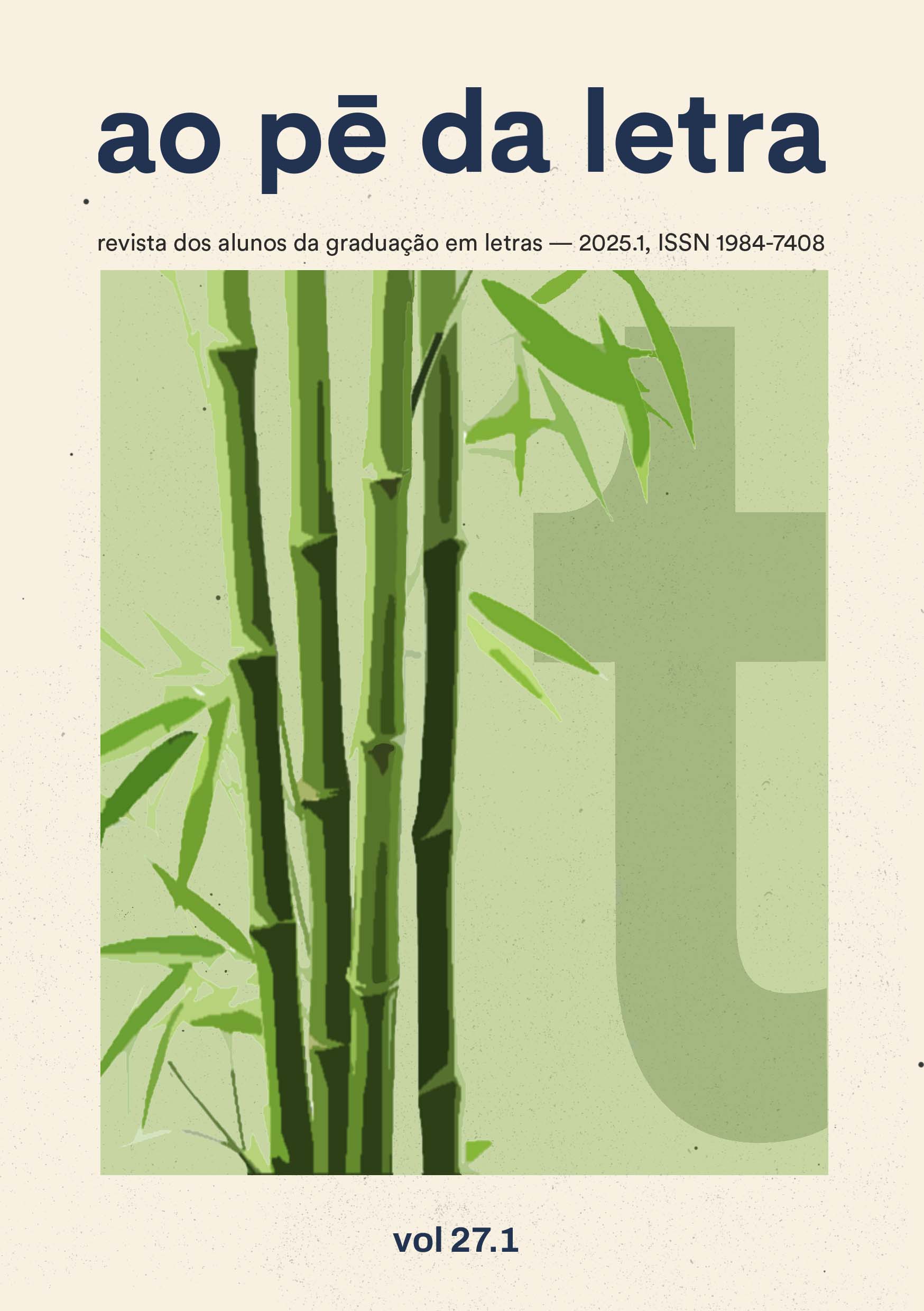Eroticism and Desire in the Female Characters of Lygia Fagundes Telles
DOI:
https://doi.org/10.51359/1984-7408.2025.265917Keywords:
Lygia Fagundes Telles, Erotismo, Literatura feminina, FeminismoAbstract
This paper proposes a study of the short stories “As Cerejas” from the book Um Coração Ardente (2012) and “Senhor Diretor” from the work Seminário dos Ratos (1977), both written by Lygia Fagundes Telles. The core of this investigation is the analysis of female representations in these narratives, focusing on how eroticism and desire are expressed by the protagonists. This approach aims to examine a possible alignment between these representations and the author's feminist perspectives regarding the expression of the erotic by female subjects. For this purpose, the study draws on the works of Bataille (1987), Paz (1994), and Branco (2004), who reflect on sexuality and eroticism; the perspectives of Grosz (2000), Perrot (2003), and hooks (2018), who discuss feminism and the misogynistic ideologies that uphold patriarchy; and the contributions of Lucas (1990), Galvão (2018), and Coelho (1991) on Lygia's prose style and the aims of women's literature in the 20th century. Through an analysis grounded in these authors' insights, it was possible to identify, in the selected stories, traces of a perspective that aligns with feminist proposals regarding female erotic and sexual freedom.
References
BATAILLE, Georges. O erotismo. Porto Alegre: L&PM, 1987.
BRANCO, Lúcia Castello. O que é erotismo. São Paulo: Brasiliense, 2004.
COELHO, Nelly Novaes. A literatura feminina no Brasil contemporâneo. Língua e Literatura, São Paulo, v. 16, n. 19, dez. 1991, p. 91-101. Disponível em: https://revistas.usp.br/linguaeliteratura/article/view/116009. Acesso em: 3 jan. 2024.
GALVÃO, Walnice Nogueira. Posfácio: O olhar de uma mulher. In: TELLES, Lygia Fagundes. Os contos. 1 ed. São Paulo: Companhia das Letras, 2018. p. 729-744.
GROSZ, Elizabeth. Corpos reconfigurados. Cadernos Pagu, Campinas, n. 11, jun. 2000, p. 45-86. Disponível em: https://periodicos.sbu.unicamp.br/ojs/index.php/cadpagu/article/view/8635340. Acesso em: 13 jul. 2023.
HOOKS, bell. O feminismo é para todo mundo: políticas arrebatadoras. 1 ed. Rio de Janeiro: Rosa dos Tempos, 2018.
LEXIKON, Herder. Dicionário de símbolos. São Paulo: Editora Cultrix, 1998.
LUCAS, Fábio. A ficção giratória de Lygia Fagundes Telles. Travessia, Florianópolis, n. 20, jan. 1990, p. 60-77. Disponível em: https://periodicos.ufsc.br/index.php/travessia/article/view/17317. Acesso em: 25 ago. 2023.
PAZ, Octavio. A dupla chama: amor e erotismo. São Paulo: Editora Siciliano, 1994.
PERROT, Michelle. Os silêncios do corpo da mulher. In: MATOS, Maria Izilda S. de; SOIHET, Rachel (org.). O corpo feminino em debate. São Paulo: Editora Unesp, 2003. p. 13-27.
TELLES, Lygia Fagundes. As Cerejas. In: TELLES, Lygia Fagundes. Um Coração Ardente. São Paulo: Companhia das Letras, 2012. p. 81-89.
TELLES, Lygia Fagundes. Senhor Diretor. In: TELLES, Lygia Fagundes. Os Contos. São Paulo: Companhia das Letras, 2018. p. 169-182.
Downloads
Published
Issue
Section
License
Copyright (c) 2025 Autor, concedendo à revista o direito à primeira publicação

This work is licensed under a Creative Commons Attribution 4.0 International License.
Autores que publicam nesta revista concordam com os seguintes termos:
- Autores mantém os direitos autorais e concedem à revista o direito de primeira publicação, com o trabalho simultaneamente licenciado sob a Licença Creative Commons Attribution 4.0 Internacional (CC BY 4.0) que permite o compartilhamento do trabalho com reconhecimento da autoria e publicação inicial nesta revista.
- Autores têm autorização para assumir contratos adicionais separadamente, para distribuição não-exclusiva da versão do trabalho publicada nesta revista (ex.: publicar em repositório institucional ou como capítulo de livro), com reconhecimento de autoria e publicação inicial nesta revista.
- Autores têm permissão e são estimulados a publicar e distribuir seu trabalho online (ex.: em repositórios institucionais ou na sua página pessoal) a qualquer ponto antes ou durante o processo editorial, já que isso pode gerar alterações produtivas, bem como aumentar o impacto e a citação do trabalho publicado (Veja O Efeito do Acesso Livre).

